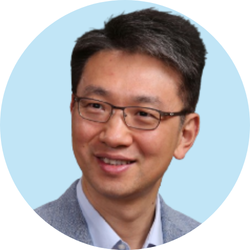
Prof.Takashi Washio
Kansai University, Japan
Dean, Faculty of Business Data Science
Takashi Washio received the ME and PhD degrees in Nuclear Engineering from Tohoku University, Miyagi, Japan, in 1985 and 1988, respectively.
He is currently a Full Professor of the Faculty of Business Data Science, Kansai University, and Professor Emeritus at Osaka University.
He was a Visiting Researcher in the Nuclear Reactor Laboratory at the Massachusetts Institute of Technology (MIT), USA, from 1988 to 1990;
a Senior Researcher at Mitsubishi Research Institute (MRI) from 1990 to 1996;
an Associate Professor at Osaka University from 1996 to 2006; and
a Full Professor at Osaka University from 2006 to 2024.
He has been studying fundamental and application research on AI since the 1980s.
Currently, he works on the application of AI to science and industry.
He has many collaborations with industries, including NEC Corporation and Kobe Steel, Ltd.
Title: Cyber-Physical Oriented AI for Science and Industry
Abstract: Along with the development of IoT and AI technologies, now we can easily convert information from the real world into data in scientific and industrial fields, and process it through various algorithms in cyberspace to solve a wide range of problems. In this lecture, I will introduce research and development examples such as the advancement of scientific measurements and the optimization of manufacturing processes using AI technologies.
Distinguished
Prof. Mark
Warschauer
University of California,
USA
Director of the Digital Learning Lab, Fellow of AERA, Member of NAEd, h-index 104
Mark Warschauer is a Professor of Education at UC
Irvine with an affiliated appointment in
Informatics, Language Science, and Psychologyical
Science, and director of the Digital Learning Lab.
He is one of the most widely-cited scholars in the
world on digital learning topics such as
computer-assisted language learning, digital
literacy, the digital divide, one-to-one laptop
classrooms, and artificial intelligence in
education. His team is currently focusing on the use
of conversational agents to support children’s
learning and on the teaching and learning of
computer science for linguistically diverse
students.
A first generation college student and former
community organizer for the United Farm Workers
union, Dr. Warschauer began his educational career
as a Spanish bilingual math and ESL teacher in San
Francisco public schools. He has previously taught
and conducted research in Hawaii, Moscow, Prague,
Egypt, China, Japan, Singapore, Mexico, and Brazil.
He has served as founding editor of Language
Learning & Technology journal and inaugural editor
of AERA Open. A former Fulbright Scholar and US
Title VII Bilingual Education Fellow, he is a Fellow
of the American Education Research Association and a
Member of the National Academy of Education.
Chair
Prof. Yunhao Liu
Tsinghua University, China
Dean of School of Software, ACM Fellow , IEEE Fellow, CCF Fellow, h-index 106
Yunhao Liu, ACM Fellow , IEEE Fellow, Chair Professor at Tsinghua University. He also served as the Dean of School of Software in Tsinghua, and the MSU Foundation Professor and the Chairperson of Department of Computer Science and Engineering in Michigan State University. Yunhao received his B.S. degree in the Department of Automation at Tsinghua University, and an M.A. degree at Beijing Foreign Studies University, China. He received an M.S. and a Ph.D. degree in Computer Science and Engineering at Michigan State University, USA. Yunhao received Hong Kong ICT Best Innovation and Research Award Grand Prize 2007, China Ministry of Education First Class Natural Science Award 2010, Second Class National Natural Science Award 2011, ACM Presidential Award 2013, CCF Wang Xuan Award 2022, CCF First Class Natural Science Award 2024, CIE First Class Natural Science Award 2024 as well as many best paper awards including ACM MobiCom 2014 best paper award, SIGCOMM 2021 Best Student Paper Award, and ACM SenSys 2023 Test of Time Award.
Title: Embodied AI: From Digital-follow-up to Digital-Leadoff
Abstract: We have passed the period of Digital-Follow-up, and now we are in Digital Twin, and trying to enter Digital-lead-off of Industrial Internet of Things. I will share lessons learned from our recent implementations of AIOT systems in oil refinery and glass factories in Middle East, United States, and China.

Chair Prof.
Qing Li
Hong Kong Polytechnic
University, China
Head of the Department of Computing, IEEE Fellow, h-index 92
Qing Li is a Chair Professor and Head of the Department of Computing, the Hong Kong Polytechnic University. He received his B.Eng. from Hunan University (Changsha), and M.Sc. and Ph.D. degrees from the University of Southern California (Los Angeles), all in computer science. His research interests include multi-modal data management, conceptual data modeling, social media, Web services, and e-learning systems. He has authored/co-authored over 500 publications in these areas, with over 52000 citations and H-index of 93 (source: Google Scholars). He is actively involved in the research community and has served as an Editor-in-Chief of Computer & Education: X Reality (CEXR) by Elsevier, an associate editor of IEEE Transactions on Artificial Intelligence (TAI), IEEE Transactions on Cognitive and Developmental Systems (TCDS), IEEE Transactions on Knowledge and Data Engineering (TKDE), ACM Transactions on Internet Technology (TOIT), Data Science and Engineering (DSE), and World Wide Web (WWW) Journal, in addition to being a Conference and Program Chair/Co-Chair of numerous major international conferences. He also sits/sat in the Steering Committees of DASFAA, ACM RecSys, IEEE U-MEDIA, WISE and ICWL. Prof. Li is a Fellow of IEEE.
Title: PolyRAG: a Multi-level Querying Method for an Indoor Robot Smart Space
Abstract: Smart Space denotes dynamic, adaptive environments enhanced with robotics and AI technologies. Examples include smart homes/offices/cafes. By leveraging and integrating Computer Vision, Natural Language Processing, AIoT, Data Mining, Recommender Systems, and Sympathetic Computing, Smart Space can help improve efficiency, personalization, and user satisfactions with seamless interactions. In this talk, we introduce PolyRAG, a multi-level knowledge QA framework supporting multi-level querying for an indoor robot application system. Building on top of a naive RAG layer, we build a knowledge pyramid by adding a knowledge graph layer and an ontology schema, so as to obtain a good balance of recall and precision when applied to a specific domain such as coffee robot interactions. We employ cross-layer augmentation techniques for comprehensive knowledge coverage and dynamic updates of the Ontology scheme and instances. To ensure compactness, we utilize cross-layer filtering methods for knowledge condensation in KGs. An experimental coffee robot prototype is constructed, and preliminary empirical studies are conducted to show the effectiveness of our PolyRAG supporting a waterfall model for querying from ontology to KG to chunk-based raw text.

Prof. Laurence T. Yang
Zhengzhou University, China
Academic Vice-President and Dean of School of Computer Science and Artificial Intelligence,
CAE Fellow, EIC Fellow, MAE Fellow, IEEE Fellow, IET Fellow, Member of RAE, Member of NAAI, h-index 105
Laurence T. Yang got his BE in Computer Science and Technology and BSc in Applied Physics both from Tsinghua University, China and Ph.D in Computer Science from University of Victoria, Canada. He is the Academic Vice-President and Dean of School of Computer Science and Artificial Intelligence, Zhengzhou University, China. His research includes Cyber-Physical-Social Intelligence. He has published 400+ papers in the above area on top IEEE/ACM Transactions with total citations of 44000+ and H-index of 105 including 8 and 44 papers as top 0.1% and top 1% highly cited ESI papers, respectively.
His recent honors and awards include the member of US National Academy of Artificial Intelligence (2025), a foreign member of Russian Academy of Engineering (2024) and a member of Academia Europaea, the Academy of Europe (2021), the John B. Stirling Medal (2021) from Engineering Institute of Canada, IEEE Sensor Council Technical Achievement Award (2020), IEEE Canada C. C. Gotlieb Computer Medal (2020), Clarivate Analytics (Web of Science Group) Highly Cited Researcher (2019, 2020, 2022, 2023, 2024), Fellow of Institution of Engineering and Technology (2020), Fellow of Institute of Electrical and Electronics Engineers (2020), Fellow of Engineering Institute of Canada (2019), Fellow of Canadian Academy of Engineering (2017), etc.
Title: Cyber-Physical-Social Intelligence
Abstract: The booming growth and rapid development in embedded systems, wireless communications, sensing techniques and emerging support for cloud computing and social networks have enabled researchers and practitioners to create a wide variety of Cyber-Physical-Social Systems (CPSS) that reason intelligently, act autonomously, and respond to the users’ needs in a context and situation-aware manner, namely Cyber-Physical-Social Intelligence. It is the integration of computation, communication and control with the physical world, human knowledge and sociocultural elements. It is a novel emerging computing paradigm and has attracted wide concerns from both industry and academia in recent years.
This talk will present our latest research on Cyber-Physical-Social Intelligence. Corresponding case studies in some typical applications will be shown to demonstrate the feasibility and flexibility.

Prof. Bin Hu
Lanzhou University,
China
Dean of the School of Information Science and Engineering, IEEE Fellow, IET Fellow, AAIA Fellow
Dr. Hu was elected as Fellow of the Institute of Electrical and Electronic Engineers (IEEE) and the Institution of Engineering and Technology (IET). He was a recipient of many research awards, including the 2014 China Overseas Innovation Talent Award, the 2016 Chinese Ministry of Education Technology Invention Award, the 2018 Chinese National Technology Invention Award, and the 2019 WIPO-CNIPA Award for Chinese Outstanding Patented Invention. He is also the TC Co-Chair of computational psychophysiology in the IEEE Systems, Man, and Cybernetics Society (SMC), the TC Co-Chair of cognitive computing in IEEE SMC, and the Vice-Chair of the TC 9.1. Economic, Business, and Financial Systems on Social Media at the International Federation of Automatic Control (IFAC). He is also a Member-at-Large of the ACM China Council and the Vice-Chair of the China Committee of the International Society for Social Neuroscience. He serves as the Editor-in-Chief for IEEE TRANSACTIONS ON COMPUTATIONAL SOCIAL SYSTEMS and an Associate Editor for IEEE TRANSACTIONS ON AFFECTIVE COMPUTING.
Title: Computational Psychophysiology and Mental Health
Abstract: In recent years, mental health issues have become increasingly prominent worldwide. According to a report from the World Health Organization, approximately 970 million people suffer from mental disorders, accounting for 13% of the global population. Currently, the diagnosis of mental illnesses primarily relies on physician interviews and the Brief Psychiatric Rating Scale (BPRS), lacking objective and quantifiable diagnostic indicators. Additionally, the common treatment for mental disorders is pharmacotherapy, which is often associated with significant side effects. The rapid advancement of cutting-edge artificial intelligence and big data technologies offers new opportunities for the diagnosis and treatment of mental disorders. These technologies are transforming the approach to data-driven screening and treatment, providing more precise, personalized, and effective solutions. This report will introduce the opportunities and challenges in the field of medical electronics and computational methodologies for the diagnosis and treatment of mental disorders.

Chair Prof. Yi Pan
Shenzhen University of Advanced Technology, China
AIMBE Fellow, IET Fellow, h-index 102
Dr. Yi Pan is currently a Chair Professor and the Dean of College of Computer Science and Control Engineering at Shenzhen Institue of Advanced Technology, Chinese Academy of Sciences, China and a Regents’ Professor Emeritus at Georgia State University, USA. He served as Chair of Computer Science Department at Georgia State University from 2005 to 2020. He has also served as an Interim Associate Dean and Chair of Biology Department during 2013-2017. Dr. Pan joined Georgia State University in 2000, was promoted to full professor in 2004, named a Distinguished University Professor in 2013 and designated a Regents' Professor (the highest recognition given to a faculty member by the University System of Georgia) in 2015.
Dr. Yi Pan is Fellow of American Institute for Medical and Biological Engineering, Foreign Member of Russian Academy of Engineering, Foreign member of Ukrainian Academy of Engineering Science, Member of European Academy of Sciences and Arts, Fellow of the Royal Society for Public Health, Fellow of the Institute of Engineering and Technology, and Fellow of the Japan Society for the Promotion of Science.
Dr. Pan received his B.Eng. and M.Eng. degrees in computer engineering from Tsinghua University, China, in 1982 and 1984, respectively, and his Ph.D. degree in computer science from the University of Pittsburgh, USA, in 1991.
Dr. Pan has published more than 450 papers including over 250 journal papers with more than 100 papers published in IEEE/ACM Transactions/Journals. In addition, he has edited/authored 43 books. His work has been cited more than 30000 times based on Google Scholar and his current h-index is 102. Dr. Pan is currently serving as Editor-in-Chief of Big Data Mining and Analytics (a top 3% journal), Associate Editor-in-Chief of Journal of Computer Science and Technology (JCST), and Chinese Journal of Electronics (CJE). Dr. Pan has served as an editor-in-chief or editorial board member for 20 journals including 7 IEEE Transactions.
Title: AI LLMs Empower Biomedical Applications
Abstract: Starting from the current state of generative artificial intelligence (AIGC) and large language models (LLMs), I will first discuss the basic principles and shortcomings of the latest AIGC products, such as ChatGPT and Sora, along with their future improvements and development trends. I will mainly elaborate on the important roles and value of AIGC in the biopharmaceutical field. Recently, ChatGPT outperformed 17 doctors by accurately diagnosing a rare disease in a 4-year-old boy. This demonstrates that, when applied appropriately, AI can indeed become an assistant in diagnosing and treating diseases. However, a study published in JAMA by Brigham and Women’s Hospital, affiliated with Harvard University, showed that ChatGPT's cancer treatment recommendations were only completely accurate in 62% of cases, indicating that its results should be applied cautiously. One solution to this issue is the use of content detection tools, such as AIGC-X and ZeroGPT. The vast information behind ChatGPT is an advantage, but in specialized fields, it also brings the downside of excessive interference information. To address this, our team has developed a large language model knowledge vector library system for autism that reduces training time and achieves similar objectives using only a small amount of training data. This lecture will also introduce the use of AIGC in designing new drug molecules. By inputting numerous small drug molecules related to the treatment of a particular disease into the AIGC system, new drug molecules can be generated. Coupled with our powerful AI drug screening capabilities, we have the potential to design new drugs suitable for specific targets.


